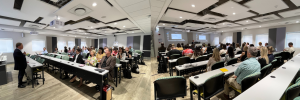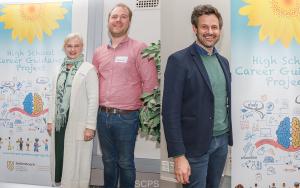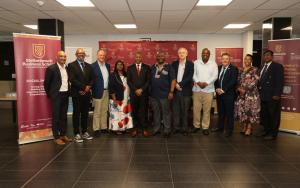
Excellence and collaboration take centre stage at EMS 2025 Research Day
- Excellence and collaboration take centre stage at EMS 2025 Research Day
Research excellence and a spirit of collaboration were at the heart of Stellenbosch University’s (SU’s) Faculty of Economic and Management Sciences (EMS) 2025 Research Day held in the CGW Schumann Building on 6 November 2025.
The annual event provides a platform for researchers to share their work across a diverse range of themes and methodologies. Its aim is to encourage cross-departmental conversation, identify new synergies and strengthen the Faculty’s research culture. It also celebrates both emerging and established researchers, with prizes awarded for the best presentations.
Reflecting on 100 years of scholarship
In his welcoming address, Prof Dieter von Fintel, Vice-Dean for Research, Postgraduate Affairs and Internationalisation, reflected on the Faculty’s centenary and future direction.
“As we reach our 100th year, we can look back on our development as a Faculty that has matured in its scholarly pursuits,” he said. “At the same time, we must look ahead to provide innovative solutions that can transform the economy and society in a volatile and uncertain world.”
Keynote panel: Bridging academia and industry
The keynote panel discussion explored how academic research connects to people’s personal and professional journeys. The panel featured experts with experience in both academia and industry:
- Dr Christie Koorts, SU Business School PhD graduate and Chief Information Officer at Woolworths South Africa;
- Prof Neil Rankin, Extraordinary Professor at SU and CEO of Predictive Insights, a data science company using machine learning to support business decisions; and
- Claire Bisseker, leading financial journalist and researcher at SU’s Bureau for Economic Research, who facilitated the discussion.
Responding to whether academia and entrepreneurship sit at opposite ends of the spectrum, Rankin highlighted the valuable overlap between the two.
“The skills developed in academia — particularly communication, presentation and the ability to distil complex problems into simple research questions — are highly transferable,” he said. “However, academia can be quite solitary, whereas entrepreneurship is team-oriented and fast-paced. If I could change one thing about my academic career, it would be to do more collaborative work — that’s an incredibly useful skill.”
He urged researchers to tap into their professional networks to build collaborations with industry.
“Your former students and postgraduate mentees often go on to do remarkable things. They know you, understand your work and are frequently open to collaboration,” he said. “There’s no shortage of opportunities — businesses are generating vast amounts of data and are eager to engage with academic researchers. You just need to find the right way in.”
Koorts added that universities could learn from how consultancy firms communicate information.
“Consultancies excel at packaging information in digestible, accessible ways,” he noted. “The onus is thus on academia to not only network more effectively but also to ask corporates: how can we make our research more accessible to you?”
Spotlight on research centres
The “Centre Flash Talks” session gave several of the Faculty’s research centres an opportunity to present their work and outline potential collaboration opportunities. Centres represented included:
- Centre for Multi-dimensional Data Visualisation (MuViSU);
- Anti-Corruption Centre for Education and Research of Stellenbosch University (ACCERUS);
- Allan Gray Centre for Africa Entrepreneurship (AGCAE);
- Institute for Futures Research (IFR);
- Centre on Conflict and Collaboration (CCC);
- Systems Thinking for Education Policy (STEP);
- Institute for Wine Business;
- Healthcare and ecology research group SURGOR;
- Centre for Corporate Governance in Africa; and
- African Centre for Development Finance (ACDF)
Prof Pregala Solosh Pillay, who leads ACCERUS within the School of Public Leadership, explained that the centre’s empirical research aims to broaden the global anti-corruption discourse.
“Some of our recent projects include studying the nature and scale of corruption in BRICS countries such as Brazil, Russia and India, and developing an anti-corruption toolkit for the United Nations,” she said. “We also signed a memorandum of understanding with the Special Investigating Unit, which has led to a new interdisciplinary Master’s degree in anti-corruption studies.”
Prof Brian Ganson, head of the CCC at the Stellenbosch Business School, described his centre’s work on conflict transformation within private sector development.
“We conduct research within contexts of conflict, which means our qualitative research is fully engaged,” he said. “Whether in Cape Town or Sierra Leone, our work involves collaborating directly with affected parties to transform and address the dynamics of conflict — conducting commissioned research for the public good.”
Wide-ranging research and collaboration
Parallel sessions throughout the day showcased research presentations spanning sustainability, soil science, taxation, investment, economic growth, transport and pandemics and their intersection with business and the economy. The School for Data Science and Computational Thinking also presented an overview of its projects and potential collaboration avenues. Specialist sessions featuring a geospatial panel and an environmental panel were also introduced.
Recognising research excellence
The audience voted Prof Chris Pentz (Established Researcher) and Lomari Theart (Early Career Researcher), both from the Department of Business Management, as winners of the presentation awards.
Prof von Fintel also announced the winners of the Faculty’s 2025 Centenary Research Competition, selected by an independent panel from SU’s Division for Research Development:
- First prize: Dr Eldridge Moses, Prof Sophia du Plessis and Prof Justin Harvey — a collaborative team from Economics and Statistics/Actuarial Science — for their project establishing a new programme in big data and traffic research; and
- Second prize: Prof Chris Pentz and Prof Marilize Terblanche Smit, representing the cross-faculty Institute for Business Research in Wine, Beer and Spirits.
In addition, Dr Johane Nienkamper-Swanepoel of MuViSU was also presented an Early Career Research award as part of the recent SU Research and Innovation Awards.
Looking ahead
In his closing remarks, Prof von Fintel reflected on the breadth of research showcased during the day.
“I’m once again struck by the diversity of topics and approaches within the EMS Faculty and enjoyed celebrating their convergence in one space,” he said. “I hope this event has encouraged people to reach across institutional boundaries to initiate conversations that can lead to exciting new collaborations.”
He added that the Faculty will continue with the event next year while also advancing its Research for Impact initiative, which was launched earlier this year.
“We must tell our stories, highlight the evidence and develop the case studies to ensure our research does not remain confined to PowerPoint slides and journal articles,” he said. “It should make a meaningful, real-world difference.”
Prof von Fintel also expressed his gratitude to Dr Jaco Franken, Manager of the Graduate School, and Tanja Malan, Postgraduate Manager, for their pivotal role in driving the Faculty’s research initiatives and their unwavering commitment to strengthening its research culture.



